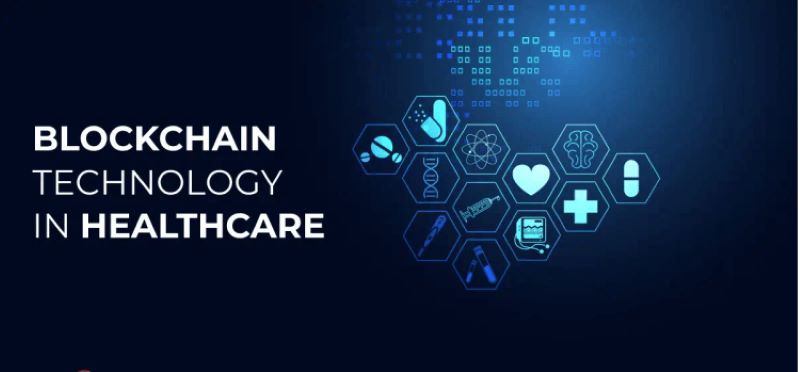Blockchain Technology in Healthcare: Revolutionizing Data Security and Patient Care
Blockchain technology is making waves across various industries, and healthcare is no exception. Known for its ability to secure and decentralize data, blockchain is quickly becoming a valuable tool in addressing some of the most pressing challenges in the healthcare sector. In this article, we will explore the impact of blockchain technology in healthcare, highlighting its benefits, use cases, and potential to revolutionize patient care and data management.

What Is Blockchain Technology?
To understand the role of blockchain technology in healthcare, it's essential to first grasp what blockchain is. At its core, blockchain is a decentralized digital ledger that records transactions across multiple computers in a way that ensures security, transparency, and immutability. Unlike traditional centralized databases, blockchain is designed to be tamper-proof, with each transaction recorded in blocks that are linked (or chained) together. This makes the data secure and verifiable by all participants in the network.In healthcare, where the integrity and security of sensitive data are paramount, blockchain’s decentralized structure can transform the way patient records, clinical trials, and supply chains are managed.
The Role of Blockchain Technology in Healthcare
Blockchain technology in healthcare serves various roles, from improving data security to enhancing transparency in medical research. Here are some key ways blockchain is shaping the future of healthcare:
Secure Patient Data Management
One of the biggest challenges in healthcare is ensuring the security of patient data. Traditional healthcare systems often rely on centralized databases that are vulnerable to data breaches and cyberattacks. Blockchain, with its decentralized and encrypted nature, offers a more secure solution.With blockchain, healthcare providers can store patient data in a way that ensures only authorized individuals can access it. This protects sensitive information from being tampered with, while also allowing patients to maintain control over their own health records. Patients can grant or revoke access to their data as needed, giving them more control over their privacy.
Improved Interoperability
In healthcare, the exchange of data between different institutions and systems is often inefficient and fragmented. Blockchain technology can help solve this by creating a unified and secure platform for data sharing.With blockchain technology in healthcare, patient data can be seamlessly transferred between hospitals, clinics, and other healthcare providers. Since all records are stored on a shared, decentralized ledger, authorized parties can access the data without the need for intermediaries or complex integrations. This improved interoperability can lead to faster diagnoses, more accurate treatments, and a better overall patient experience.
Transparency in Clinical Trials
Blockchain technology can also play a critical role in ensuring transparency and accountability in medical research and clinical trials. One of the key issues in clinical trials is the manipulation of data to produce favorable outcomes, which can lead to misinformation and dangerous consequences.Blockchain’s immutable ledger can track every step of a clinical trial, from the initial data collection to the final results. This transparency ensures that data cannot be altered, making it easier for regulators, researchers, and the public to verify the integrity of the research.
Drug Supply Chain Management
Counterfeit drugs are a major problem in the global pharmaceutical industry, costing billions of dollars and endangering lives. Blockchain technology provides a solution by offering traceability throughout the drug supply chain.With blockchain technology in healthcare, pharmaceutical companies can track drugs from the point of manufacture to the final consumer. Each transaction or transfer is recorded on the blockchain, ensuring that the entire supply chain is transparent and verifiable. This helps prevent counterfeit drugs from entering the market and ensures that patients receive authentic, safe medications.
Smart Contracts for Healthcare Services
Smart contracts, a feature of blockchain technology, can automate and streamline many processes in healthcare. These are self-executing contracts where the terms are written into the code, automatically enforcing the agreed conditions once the criteria are met.In healthcare, smart contracts can be used for insurance claims, billing, and payment processes. For example, a smart contract could automatically release payment to a healthcare provider once a treatment is completed and verified, reducing administrative overhead and ensuring faster payments.
Empowering Patients Through Data Ownership
A major advantage of blockchain technology in healthcare is its ability to give patients ownership over their own health data. Traditionally, healthcare providers or institutions have been the primary custodians of medical records. Blockchain shifts the control back to the patients, allowing them to decide who can access their records and how their data is used.This patient-centric approach not only improves privacy but also enables more personalized healthcare. By giving patients full control of their health data, blockchain encourages greater collaboration between patients and providers, leading to better outcomes and more efficient care.
The Challenges of Implementing Blockchain in Healthcare
While the benefits of blockchain technology in healthcare are significant, there are still challenges to overcome. Some of the hurdles include:
The Future of Blockchain Technology in Healthcare
Despite the challenges, the potential for blockchain technology in healthcare is immense. As blockchain solutions evolve and become more scalable, they will likely play an increasingly important role in securing patient data, improving collaboration across healthcare providers, and streamlining processes.The future of healthcare will undoubtedly see more decentralized systems where patients have greater control over their data, and blockchain will be at the heart of this transformation. With its ability to secure data, enhance transparency, and improve efficiency, blockchain has the power to revolutionize the way healthcare is delivered worldwide.The integration of blockchain technology in healthcare is already showing promise, from securing patient data to improving the transparency of clinical trials and supply chains. As the healthcare industry continues to adopt this innovative technology, we can expect to see more patient-centric systems that prioritize privacy, security, and efficiency.Blockchain has the potential to address some of the most significant challenges in healthcare today, creating a more secure, transparent, and efficient system for both patients and providers.
Read more: https://blockchainsolve.com/blockchain-technology-in-healthcare/
